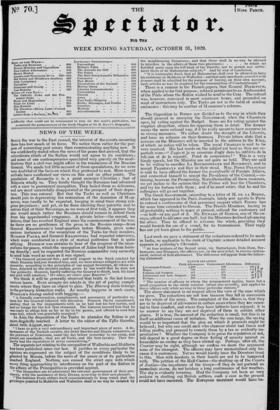NEWS OF THE WEEK.
Sine the war in the East ceased, the interest of the events occurring there has lost much of its force. We notice them rather for the pur- Sine the war in the East ceased, the interest of the events occurring there has lost much of its force. We notice them rather for the pur- pose of correcting past errors than communicating anything new. It was confidently stated when the news of the peace first arrived, that the subordinate chiefs of the Sultan would not agree to its conditions ; and some of our contemporaries speculated very gravely on the modi- fications that a civil war might effect in the resolutions of the Russian General. We made but little account of these speculations, for we were very doubtful of the facts on which they professed to rest. More recent arrivals have confirmed our views on this and on other points. The population of Roumelia is in a great measure Christian ; that of Bulgaria wholly so. They fondly thought the Russians had advanced with a view to permanent occupation. They hailed them as deliverers, and are most sorrowfully disappointed at the prospect of their depar- ture. This was natural. But that the Turks as well as Christians should join in deprecating the restoration of the dominion of MAH- MOUD, was hardly to be expected, keeping in mind their strong reli- gious prejudices ; and yet, so far from allowing their patriotic zeal to outrun that of their Sovereign, as we were at first told, it appears they also would much rather the Russians should remain to defend them from his apprehended vengeance. A private letter—the second, we believe, that has reached England since the commencement of the war, for there are no gentlemen of the press in the Russian camp—from General KnAssowsici's head-quarters before Shumla, gives some curious instances of the veneration of the Turks for their invaders. HUSSEIN PACHA and General KRASSOWSKI had repeated interviews, which were conducted in a style of mutual politeness that is quite edifying. HUSSE IN was anxious to hear of the progress of the mego- ciations for peace, which the occupation of Aidos kept him from learn- ing directly; and he requested the Russian commander very earnestly to send him word as soon as it was signed. "The General promised this ; and with respect to the frank conduct for which Hussein had just thanked him, said, we were always obliged to act with sincerity, according to the principles of our august Sovereign, all whose ac- tions, directed by the strictest justice, prove to the world that he does not fear publicity. Hussein, hardly suffering the General to finish, took his hand and said with emotion, We adore, we revere your Emperor.'" We think it will be generally observed that truth is the last lesson nations learn. Even savages are adepts in the art of paying compli- ments where they have an object to gain. The Blarney stone belongs to the primary formation rocks. As usually happens in such cases, HUSSEIN'S booing ended with begging:— " A friendly conversation, compliments, and assurances of particular es- teem for the General followed this discourse. Hussein Pacha complained, smiling, that in the engagements with us he had lost his best horses, and had no forage for the few that remained. The General assured him that he was ready to oblige him as far as lay in his power, and offered to send him some hay, which was gratefully accepted." In Asia the disposition of the Turks to abandon the Sultan is yet more dmidedly marked. A letter to the editor of the Tiflis Gazette, dated 30th August, says- " I have to give a very extraordinary and important piece of news. A de- tachment of the Turkish cavalry, the Dehli Baschis and Haytis volunteers, of the province of Erzeroum, came the day before yesterday to our camp, and joined our standards; they are all Turks, and the best cavalry. They for- merly had the reputation of never surrendering." • The separate act relating to the occupation of Wallachia and Moldavia has been published since our last. It justifies in every particular the opinion we expressed on the subject of the conditions likely to be granted by Russia, before the news of the peace or of its particulars reached England. Nothing can exceed the strict care with which every thing approaching to interference on the part of the Sultan in the affairs of the Principalities is provided against. "The Hospodars are to administer the internal government of their pro- vinces, with the assistance of their Divans, according to their own pleasure. "The Sublime Porte obliges itself conscientiously to keep watch that the privileges granted to Moldavia and Wallachia shall in no way be violated by
the neighbouring Governors; and that these shall in no way be allowed to interfere in the affairs of those two provinces • to retain no fortified point upon the left bank of the Danube, nor to permit any settle- ment there of its Mahoinetan subjects." And by way of conclusion,
"It is irrevocably fixed, that no Mahometan shall ever be allowed to have his residence in Moldavia or 'Wallachia: andthat only merchants provided frith firmans shall be admitted for the purpose of buying, on their own account, such articles as may be required for the consumption of Constantinople." There is a rumour in the French papers, that General DIEBITSCH, when applied to for that purpose, refused permission to an Ambassador of the Porte whom the Sultan wished to send to the Czar. The refusal was, however, conveyed in most courteous terms, and grounded on want of instructions only. The Turks are not in the habit of sending embassies : this may be another of MAHMOOD'S reforms.


















